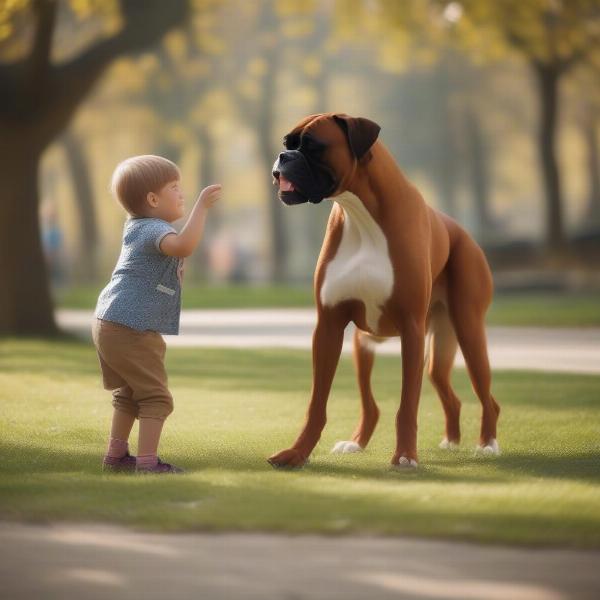The European Boxer dog, a breed known for its striking appearance and playful personality, is a popular choice for families and individuals worldwide. This guide delves into every aspect of owning a European Boxer, from understanding their temperament and specific needs to ensuring their health and well-being. Whether you’re a seasoned dog owner or considering welcoming a Boxer into your home for the first time, this comprehensive guide will provide valuable insights into this remarkable breed.
Understanding the European Boxer Temperament and Personality
European Boxers are known for their playful, energetic, and affectionate nature. They are intelligent and eager to please, making them relatively easy to train. However, their exuberance requires consistent training and socialization from an early age. Their playful nature often extends into adulthood, earning them the nickname “the Peter Pan of dogs.” Boxers are loyal and protective of their families, making them excellent companions and watchdogs. They thrive on human interaction and form strong bonds with their owners. However, their protective instincts can sometimes lead to wariness of strangers, highlighting the importance of early socialization.
 European Boxer Dog Playing
European Boxer Dog Playing
Health Considerations for European Boxer Dogs
Like all breeds, European Boxers are prone to certain health conditions. Responsible breeders screen their dogs for these conditions to minimize the risk in their litters. Some common health concerns include hip dysplasia, cardiomyopathy, and certain types of cancers. Regular veterinary checkups, a balanced diet, and appropriate exercise are crucial for maintaining their overall health and well-being. Understanding these potential health issues allows owners to be proactive in ensuring their Boxer receives the best possible care. Early detection and preventative measures can significantly improve a Boxer’s quality of life.
Training and Socializing Your European Boxer
Early training and socialization are paramount for a well-behaved European Boxer. euro boxer dog Their intelligence and eagerness to please make them receptive to training, but their energetic nature requires patience and consistency. Positive reinforcement methods work best with Boxers. Expose your Boxer to various people, animals, and environments from a young age to ensure they develop into well-adjusted adults. Proper socialization helps prevent behavioral issues like fear aggression or excessive barking.
Nutritional Needs of a European Boxer
A balanced diet is essential for a European Boxer’s health and vitality. High-quality dog food formulated for large breeds is recommended. The amount of food will vary depending on the dog’s age, activity level, and individual metabolism. american vs european boxer dog Consult your veterinarian to determine the appropriate portion sizes and feeding schedule for your Boxer. Avoid overfeeding, as Boxers are prone to weight gain, which can exacerbate health problems like hip dysplasia.
Grooming Your European Boxer
European Boxers have a short, smooth coat that requires minimal grooming. Regular brushing helps remove loose hair and keep their coat shiny. Occasional baths are sufficient. Pay attention to their facial wrinkles, which can trap dirt and moisture, requiring regular cleaning to prevent infections.
Exercising Your European Boxer
Boxers are energetic dogs that require regular exercise to stay healthy and happy. Daily walks, runs, or playtime in a securely fenced yard are essential. They also enjoy engaging in activities like agility training or playing fetch. dog euro Providing adequate exercise outlets helps prevent boredom and destructive behaviors.
Conclusion
The European Boxer dog is a loving, energetic, and intelligent breed that makes a wonderful companion for families and individuals alike. Understanding their specific needs and providing proper care, including training, socialization, nutrition, and exercise, is crucial for ensuring a long, healthy, and happy life for your Boxer. By following the guidelines in this guide, you can build a strong bond with your European Boxer and enjoy the many rewards of owning this remarkable breed.
FAQ
- Are European Boxers good with children? Yes, European Boxers are generally good with children, especially when raised with them. However, supervision is always recommended, especially with young children.
- How much exercise does a European Boxer need? European Boxers need at least an hour of exercise per day.
- What are the common health problems in European Boxers? Common health problems include hip dysplasia, cardiomyopathy, and certain cancers.
- Are European Boxers easy to train? European Boxers are intelligent and eager to please, making them relatively easy to train with positive reinforcement methods.
- What is the lifespan of a European Boxer? The average lifespan of a European Boxer is 9-12 years.
- Do European Boxers bark a lot? European Boxers can bark if not properly trained and socialized.
- Are European Boxers good apartment dogs? While they can adapt to apartment living, European Boxers thrive in homes with yards where they can expend their energy.
About ILM Dog
ILM Dog is your trusted international resource for all things dog-related. We offer expert advice and practical information on dog breeds, health, training, nutrition, grooming, and much more. From choosing the right breed to providing the best care for your canine companion, ILM Dog is here to support you every step of the way. We specialize in providing valuable insights into various dog breeds, including their unique characteristics and specific needs. Whether you’re a first-time dog owner or a seasoned expert, ILM Dog offers a wealth of knowledge to enhance your dog ownership experience. Contact us at [email protected] or +44 20-3965-8624 for any inquiries.